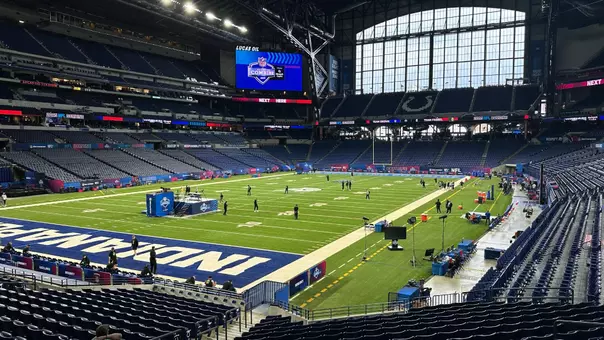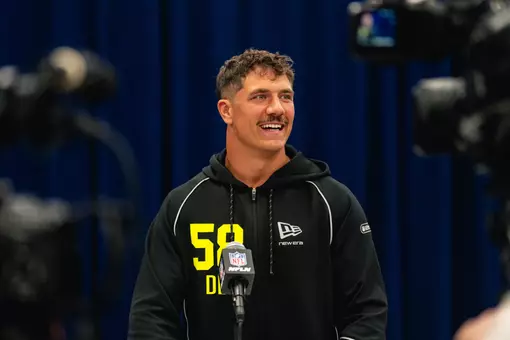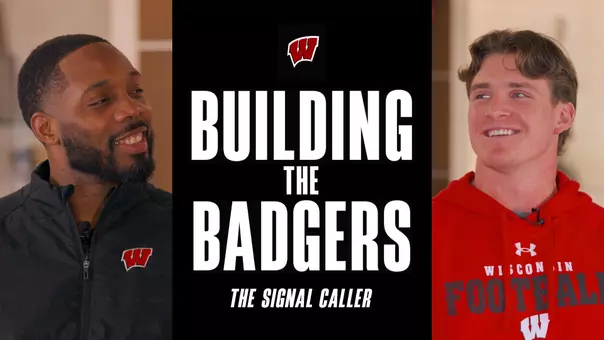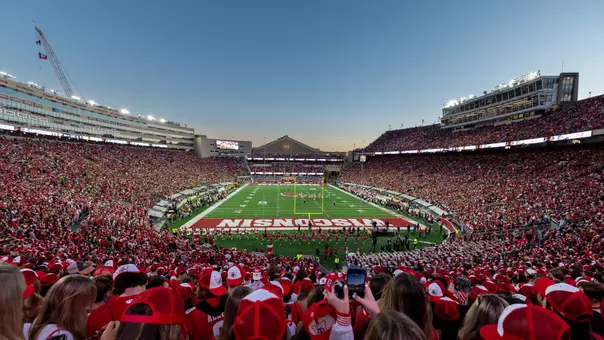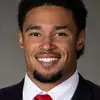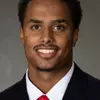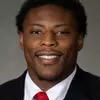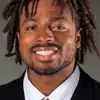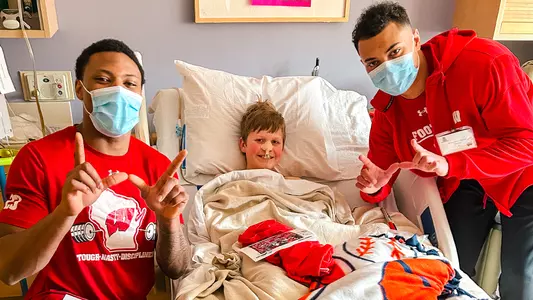
Wisconsin football players Jason Maitre and Avyonne Jones visit with a patient at the American Family Children's Hospital
Baggot: Official visits return to the American Family Children's Hospital
April 14, 2023 | Football, Badgers Give Back, Andy Baggot
After a three-year absence due to Covid-19, the Badgers are the ones grateful to return to American Family Children’s Hospital
BY ANDY BAGGOT
UWBadgers.com Insider
MADISON, Wis. - It was one of countless human rituals to be scuttled by the global pandemic.
For nearly three decades, University of Wisconsin student-athletes made a weekly pilgrimage to visit patients and families at the American Family Children's Hospital.
The practice began in the early 1990s with members of the football team stopping by every Friday before home games at Camp Randall Stadium. Before long, men and women from the other 22 sports programs, lured by the vibes of goodwill and selflessness, were organizing visitations of their own.
It got to a point that UW Athletics created a community relations department and hired Jackie Davenport to oversee such projects.
Everything changed when COVID reared its head in 2020. Like college administrators everywhere, Davenport had to improvise. One of her priorities was to make sure that the lines of support and inspiration with those at AFCH were kept open despite no in-person contact. It was a challenge.
"It was a terrible time for so many and we just wanted to be there to support our community," Davenport said.
So when the sprawling medical facility on the western edge of the UW campus allowed the Badgers to return in person this spring, no one was happier than Davenport unless you count Nikki Stafford, the VP of Pediatric Services and President for AFCH.
"We are beyond excited to have our Badger Friday back in person," she wrote in an email. "We always knew how much these visits meant to our patients and their families and this was emphasized upon their recent turn."
The first group of UW student-athletes to visit AFCH in three years were football players, including redshirt freshman cornerback Avyonne Jones, sophomore safety Austin Brown, redshirt junior cornerback Max Lofy and senior cornerbacks Alexander Smith and Jason Maitre.
"Honestly, it blew my expectations away," Smith said. "It was really good to get in and see the kids and have conversations with them."
Smith, from Culver City, Calif., said he visited the VA Hospital in Madison as a freshman and worked with the Boys and Girls Club back home. This was a different experience.
"I was kind of wide-eyed just to see what it was going to be like," he said. "It's definitely an inspiration. Those kids are going through the worst. They're fighting for their lives every day. Seeing that gives you perspective that you're blessed to be able to come out here and run around and be with your brothers every day. Not everyone gets that opportunity. You thank God for the blessing."
When in-person visits were shelved by the pandemic, Davenport had student-athletes write messages with sidewalk chalk, take pictures of them and forward them to AFCH staff, who put them on a loop to be shown on TVs and electronic message boards throughout the complex. That eventually gave way to Zoom calls.
Jones, from Southlake, Texas, participated in the virtual process. He likes the in-person engagement much better.
"It was really, really cool," he said of the calls, "but it's kind of a completely different feeling getting there and seeing the emotions and having a face-to-face connection with some of those kids. It means a lot more to them."
"Being there in-person is just so different," Davenport said. "I can tell you about it, but until you go and experience it and you see the actual impact, there's nothing like it."
Turns out the AFCH staff missed having the UW student-athlete visit as much as the patients and families. When the first group of visitors arrived they got a rousing ovation from the nurses on duty.
"We are so fortunate that we have the partnership that we do (with UW Athletics) and hope that all the athletes who walk through our doors know the impact their visits make and the immense gratitude we have for each and every one of them," Stafford said.
Why volunteer for such a thing? Every answer is different.
"I used to coach kids in high school and I've got two little brothers back home," said Brown, who's from Johnston City, Ill. "My mom does home health care. When I was in elementary school, we went to the Ronald McDonald House, the one in Chicago, and we stayed there for a month in the summer, so I got to meet a lot of kids who were going through a hard time."
Jones finds it inspiring.
"It puts everything into perspective," he said. "You see them and how they're fighting, going through their daily battles. They're out here fighting battles that are way harder than what I'm going through. It gives you a perspective that sometimes you think things are worse than they really are and you can put your head down and work through it.
"We wouldn't be where we are without the people that support us and those people are going through their hardships just as we're going through our hardships. Anything we can do to help them is something I'm proud to do."
Smith related how he was twice hospitalized with pneumonia when he was a child.
"Why not go?" he asked rhetorically. "Give back to the community and show some kids some love and put a smile on their face."
Smith said he and Lofy had a memorable conversation with a young patient, a Chicago Bears fan who was fired up to see two former UW linebackers – T.J. Edwards and Jack Sanborn – in the mix.
"He was really energetic despite his situation," Smith said. "It was contagious energy. He had a smile on his face the whole time."
Taking part in such an exercise requires a certain feel.
"Just treat them with care," Smith said.
"They appreciate being talked to like they're regular people," Jones said.
"You've just got to go in there and understand that whatever situation they're in is obviously not the best," Brown said. "You want to go in there with a smile on your face, avoid anything that can possibly bring back bad memories for them whatever the situation is and go in there and brighten their day. Be a friend to them."
At the end of the day, how do the UW visitors know if they've had an impact?
"Seeing the smile on their face," Brown said. "They might have tubes or a trach or whatever going on, but when you're sitting there laughing with them and they've got a smile on their face, it seems like they can forget that for a little bit."
Jones said there are tangible signs that you've made a connection.
"The biggest way you can tell that you've had an impact is just whenever you feel them starting to open up," he said. "At first they'll be a little shy, but then the conversation goes on and you see their face start to light up and they start to talk more and more. You feel the energy in the room change."
Smith left AFCH unsure of the impression he made.
"I honestly don't know if I had an impact," he said. "That's something I have to see to believe. I just hope that I did, that those kids will remember the experience, not necessarily meeting a Badger player, but somebody coming in and showing love to them."
Brown said he wouldn't hesitate to volunteer again.
"It makes you realize not to take anything for granted," he said. "Everything you have, attack it with full effort and enthusiasm and enjoy every day that you have."
UWBadgers.com Insider
MADISON, Wis. - It was one of countless human rituals to be scuttled by the global pandemic.
For nearly three decades, University of Wisconsin student-athletes made a weekly pilgrimage to visit patients and families at the American Family Children's Hospital.
The practice began in the early 1990s with members of the football team stopping by every Friday before home games at Camp Randall Stadium. Before long, men and women from the other 22 sports programs, lured by the vibes of goodwill and selflessness, were organizing visitations of their own.
It got to a point that UW Athletics created a community relations department and hired Jackie Davenport to oversee such projects.
Everything changed when COVID reared its head in 2020. Like college administrators everywhere, Davenport had to improvise. One of her priorities was to make sure that the lines of support and inspiration with those at AFCH were kept open despite no in-person contact. It was a challenge.
"It was a terrible time for so many and we just wanted to be there to support our community," Davenport said.
So when the sprawling medical facility on the western edge of the UW campus allowed the Badgers to return in person this spring, no one was happier than Davenport unless you count Nikki Stafford, the VP of Pediatric Services and President for AFCH.
"We are beyond excited to have our Badger Friday back in person," she wrote in an email. "We always knew how much these visits meant to our patients and their families and this was emphasized upon their recent turn."
The first group of UW student-athletes to visit AFCH in three years were football players, including redshirt freshman cornerback Avyonne Jones, sophomore safety Austin Brown, redshirt junior cornerback Max Lofy and senior cornerbacks Alexander Smith and Jason Maitre.
"Honestly, it blew my expectations away," Smith said. "It was really good to get in and see the kids and have conversations with them."
Smith, from Culver City, Calif., said he visited the VA Hospital in Madison as a freshman and worked with the Boys and Girls Club back home. This was a different experience.
"I was kind of wide-eyed just to see what it was going to be like," he said. "It's definitely an inspiration. Those kids are going through the worst. They're fighting for their lives every day. Seeing that gives you perspective that you're blessed to be able to come out here and run around and be with your brothers every day. Not everyone gets that opportunity. You thank God for the blessing."
When in-person visits were shelved by the pandemic, Davenport had student-athletes write messages with sidewalk chalk, take pictures of them and forward them to AFCH staff, who put them on a loop to be shown on TVs and electronic message boards throughout the complex. That eventually gave way to Zoom calls.
Jones, from Southlake, Texas, participated in the virtual process. He likes the in-person engagement much better.
"It was really, really cool," he said of the calls, "but it's kind of a completely different feeling getting there and seeing the emotions and having a face-to-face connection with some of those kids. It means a lot more to them."
"Being there in-person is just so different," Davenport said. "I can tell you about it, but until you go and experience it and you see the actual impact, there's nothing like it."
Turns out the AFCH staff missed having the UW student-athlete visit as much as the patients and families. When the first group of visitors arrived they got a rousing ovation from the nurses on duty.
"We are so fortunate that we have the partnership that we do (with UW Athletics) and hope that all the athletes who walk through our doors know the impact their visits make and the immense gratitude we have for each and every one of them," Stafford said.
Why volunteer for such a thing? Every answer is different.
"I used to coach kids in high school and I've got two little brothers back home," said Brown, who's from Johnston City, Ill. "My mom does home health care. When I was in elementary school, we went to the Ronald McDonald House, the one in Chicago, and we stayed there for a month in the summer, so I got to meet a lot of kids who were going through a hard time."
Jones finds it inspiring.
"It puts everything into perspective," he said. "You see them and how they're fighting, going through their daily battles. They're out here fighting battles that are way harder than what I'm going through. It gives you a perspective that sometimes you think things are worse than they really are and you can put your head down and work through it.
"We wouldn't be where we are without the people that support us and those people are going through their hardships just as we're going through our hardships. Anything we can do to help them is something I'm proud to do."
Smith related how he was twice hospitalized with pneumonia when he was a child.
"Why not go?" he asked rhetorically. "Give back to the community and show some kids some love and put a smile on their face."
Smith said he and Lofy had a memorable conversation with a young patient, a Chicago Bears fan who was fired up to see two former UW linebackers – T.J. Edwards and Jack Sanborn – in the mix.
"He was really energetic despite his situation," Smith said. "It was contagious energy. He had a smile on his face the whole time."
Taking part in such an exercise requires a certain feel.
"Just treat them with care," Smith said.
"They appreciate being talked to like they're regular people," Jones said.
"You've just got to go in there and understand that whatever situation they're in is obviously not the best," Brown said. "You want to go in there with a smile on your face, avoid anything that can possibly bring back bad memories for them whatever the situation is and go in there and brighten their day. Be a friend to them."
At the end of the day, how do the UW visitors know if they've had an impact?
"Seeing the smile on their face," Brown said. "They might have tubes or a trach or whatever going on, but when you're sitting there laughing with them and they've got a smile on their face, it seems like they can forget that for a little bit."
Jones said there are tangible signs that you've made a connection.
"The biggest way you can tell that you've had an impact is just whenever you feel them starting to open up," he said. "At first they'll be a little shy, but then the conversation goes on and you see their face start to light up and they start to talk more and more. You feel the energy in the room change."
Smith left AFCH unsure of the impression he made.
"I honestly don't know if I had an impact," he said. "That's something I have to see to believe. I just hope that I did, that those kids will remember the experience, not necessarily meeting a Badger player, but somebody coming in and showing love to them."
Brown said he wouldn't hesitate to volunteer again.
"It makes you realize not to take anything for granted," he said. "Everything you have, attack it with full effort and enthusiasm and enjoy every day that you have."
Players Mentioned
Wisconsin Football || Vinny Anthony II NFL Combine Media || Feb. 27, 2025
Friday, February 27
Wisconsin Football || Mason Reiger NFL Combine Media || Feb. 25, 2025
Wednesday, February 25
Wisconsin Football || Building the Badgers || Episode 7 || Colton Joseph
Thursday, February 12
Wisconsin Football || Building the Badgers || Episode 5
Monday, February 02

